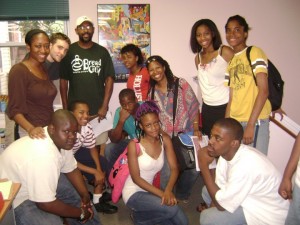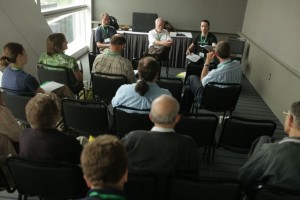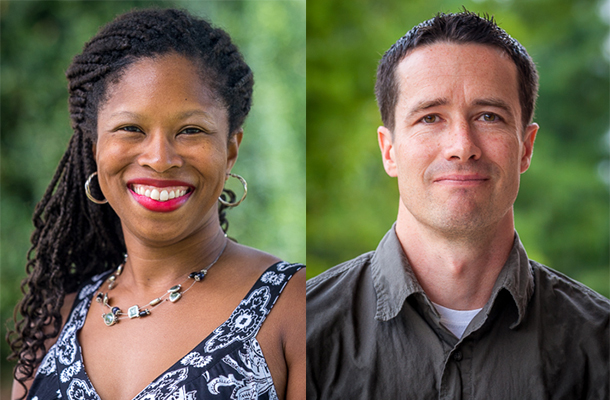New faculty members Johonna Turner and Tim Seidel bring strong ties to Eastern Mennonite University (EMU), the Center for Justice and Peacebuilding (CJP), and to Mennonite peacebuilding organizations, as well as a variety of practice, theory, teaching and research experience.
Turner, an assistant professor of restorative justice and peacebuilding, will begin teaching this fall. As an educator and community activist, she brings experience with and a focus on peacebuilding within urban communities; the capacity of churches in under-resourced areas to build indigenous leadership for peace and justice; and the contributions of youth and youth leadership, primarily by urban students of color, to grassroots organizing in support of the restorative justice social movement.
Seidel, a PhD candidate at American University School of International Service, will start January 2016 as assistant professor of international development. Though his primary affiliation will be in the department of applied social sciences where he will co-lead the peacebuilding and development undergraduate major and teach political economy and international development, Seidel will also teach graduate courses in international development and action research among others. With experience in international peacebuilding and interfaith engagement, Seidel looks forward to “engaging students in critical reflection around issues of politics, development, and peacebuilding.”
The hires of Seidel and Turner continue a trend in which faculty share expertise in peacebuilding and development across undergraduate and graduate programs, strengthening CJP and the undergraduate major. “Both of these faculty members bring specialty knowledge needed among EMU’s peacebuilding programs at all levels,” said Gloria Rhodes, faculty member at CJP and department chair of the applied social sciences.
CJP Executive Director J. Daryl Byler adds that Turner and Seidel “will help meet CJP’s vision of preparing leaders to create a just and peaceful world – both here in the United States and in other countries.”
Johonna Turner: multi-faceted educator and activist
Turner first came to EMU to participate in the Summer Peacebuilding Institute in 2010 and returned in subsequent years, before being invited to co-teach a restorative justice course with Carl Stauffer, assistant professor of development and justice studies and now co-director of the Zehr Institute for Restorative Justice.
Students in that course “appreciated her knowledge, insights and creative teaching,” said Jayne Docherty, CJP program director. “Dr. Turner brings a wealth of experience helping young people mobilize to prevent violence and promote justice in their communities.”
Turner’s teaching experience ranges across all levels – from the elementary school, middle and high school classroom to graduate students – and with several special populations of learners, including special needs and adjudicated youth; first-generation, low-income students; and those with low literacy skills.

During the last four years, she worked in the District of Columbia Public Schools, most recently with an administrative team in an elementary school implementing “Response to Intervention,” a student-centered multi-level program to maximize student achievement, increase literacy skills and reduce behavioral problems. She also taught special education and English, and coordinated after-school programs at H.D. Woodson Senior High School.
As an adjunct instructor at University of Maryland, College Park, from 2004 to 2009 while earning her doctorate in American studies, Turner taught a variety of courses, including identity, power and privilege; prisons, policing and confinement; art as social change; public leadership and social change; and urban youth and youth organizing.
At the same time, she founded and directed the Visions to Peace Project, in which both free and adjudicated youth engaged in leadership programs using arts and organizing as healing tools.
“For much of my life, my commitments to social justice and faith were lived out in different communities,” Turner said. “EMU attracted me as a place where I could learn and work as a whole person – a Christian deeply committed to peacebuilding, justice and praxis, the integration of reflection and action.”
She holds bachelor’s degrees in journalism and interdisciplinary studies from University of Missouri, Columbia, as well as graduate certificates in urban youth ministry from Fuller Theological Seminary and in women’s studies from the University of Maryland, College Park.
Tim Seidel: experience in international development and interfaith engagement

Seidel’s 10-year career with Mennonite Central Committee (MCC) began with a legislative internship soon after graduating in 2003 with two master’s degrees, from different institutions, in theological studies and international peace and conflict resolution. From 2004 to 2007, he was a peace development worker in Palestine, eventually moving to Akron, Pennsylvania, to spend six years as director of MCC’s Peace and Justice Ministries.
“His perspective on governance issues and development will deepen our ability to connect the work of building peace with justice to processes of changing policies and promoting inclusive governance at all levels of social organization,” said Docherty.
Besides working with many EMU graduates at MCC, Seidel and his wife hosted EMU students on their cross-cultural in Palestine, and he’s taken Strategies for Trauma Awareness and Resilience (STAR) training. EMU has an attraction as “a learning community where teaching, scholarship, and service are all valued,” he said.
Since leaving MCC, Seidel has been teaching at American University and Lancaster Theological Seminary, where he’s organized and led cross-cultural trips to Palestine and Israel for divinity students.
His dissertation is about nonviolence and civil resistance in Palestine. “I am interested in exploring how certain understandings or representations of others, the stories we tell and the images we privilege, become ‘normal’ or even ‘natural’ in the sense that we don’t always think or imagine that there are other ways of understanding others or understanding the world around us,” he said.
Seidel is a 1999 graduate of Messiah College, with degrees in biochemistry, mathematics and cultural anthropology.

Congrats Johonna and Tim!
I wish I could attend your lectures!